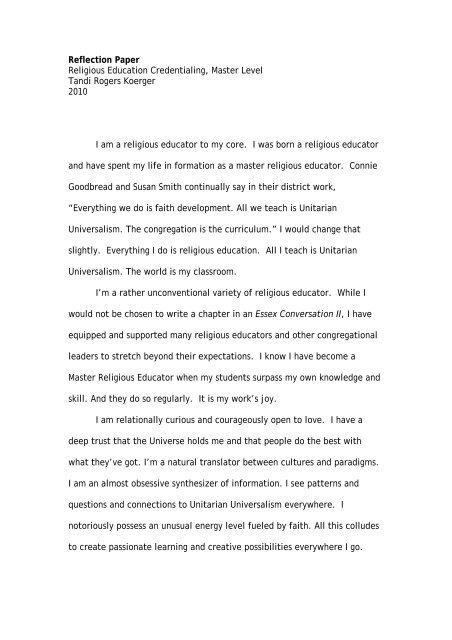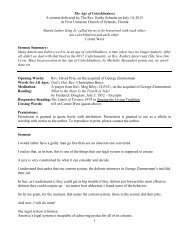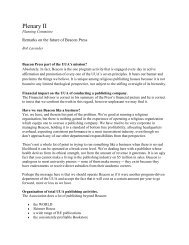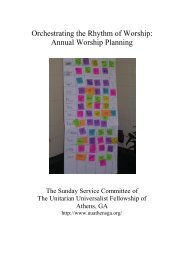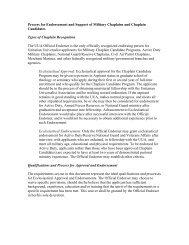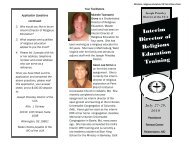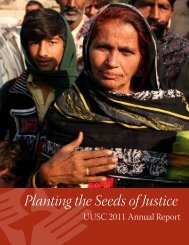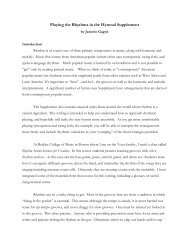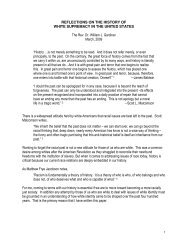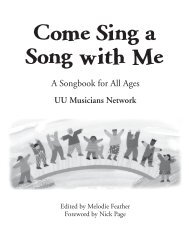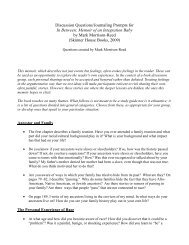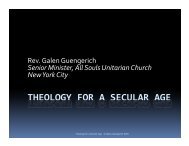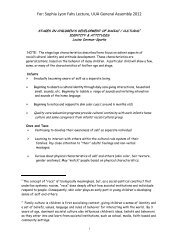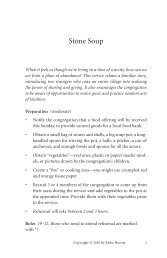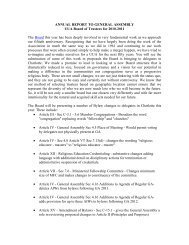Sample Master Level Reflection Paper - Unitarian Universalist ...
Sample Master Level Reflection Paper - Unitarian Universalist ...
Sample Master Level Reflection Paper - Unitarian Universalist ...
- No tags were found...
You also want an ePaper? Increase the reach of your titles
YUMPU automatically turns print PDFs into web optimized ePapers that Google loves.
<strong>Reflection</strong> <strong>Paper</strong>Religious Education Credentialing, <strong>Master</strong> <strong>Level</strong>Tandi Rogers Koerger2010I am a religious educator to my core. I was born a religious educatorand have spent my life in formation as a master religious educator. ConnieGoodbread and Susan Smith continually say in their district work,“Everything we do is faith development. All we teach is <strong>Unitarian</strong>Universalism. The congregation is the curriculum.” I would change thatslightly. Everything I do is religious education. All I teach is <strong>Unitarian</strong>Universalism. The world is my classroom.I’m a rather unconventional variety of religious educator. While Iwould not be chosen to write a chapter in an Essex Conversation II, I haveequipped and supported many religious educators and other congregationalleaders to stretch beyond their expectations. I know I have become a<strong>Master</strong> Religious Educator when my students surpass my own knowledge andskill. And they do so regularly. It is my work’s joy.I am relationally curious and courageously open to love. I have adeep trust that the Universe holds me and that people do the best withwhat they’ve got. I’m a natural translator between cultures and paradigms.I am an almost obsessive synthesizer of information. I see patterns andquestions and connections to <strong>Unitarian</strong> Universalism everywhere. Inotoriously possess an unusual energy level fueled by faith. All this colludesto create passionate learning and creative possibilities everywhere I go.
I don’t remember ever making a distinction between the religiousnature of church life and the religious nature of public education. In someways, public and tribal education are more sacred and hold moreopportunity for religious exploration, at least in the way that most religiouseducation programs are currently designed. When I opted to pursue amaster’s degree the real decision was between a <strong>Master</strong>s of Education and a<strong>Master</strong>s of Divinity. I was answering a very real call to ministry. I chose a<strong>Master</strong>s of Education, specifically to be a religious educator with acommunity of learners Monday through Friday.Who am I? What is the ultimate? What is my relationship to theultimate? What are my responsibilities to my connections with the rest ofthe world? What do I value, need, and love? What is the meaning of my life?These are all questions I weave into any “classroom” in my care.Life Learning & Faith Development Touch PointsAdoption—My theological orientation emerged concurrently with myidentity as an adoptee. I interpreted my story of origin as a <strong>Universalist</strong>mandate. There was a very real possibility that I could be related to anystranger I met on the street. Even at a young age, I took this very seriously.Soon after I learned to read I started pouring through newspaper obituarieslooking for people who looked like me and therefore could be related. Ibecame engrossed in people’s stories. It became a life-long spiritualdiscipline. Theologically, I am related to every one of those stories and so I3
give my gratitude for their lives, gifts, and struggles. I am related to all ofhumankind.Sesame Street—I grew up in a small, Midwest farming communitywhere homogeny reigned and the culture was reserved. When I was a verysmall child the one hour a day when I felt joyously alive and well was when Iwatched Sesame Street. I loved learning and singing and being silly. Andthe cultural diversity among people and monsters was very clear to me. Thedifferences between Sesame Street and Vermilion, Ohio were very clear tome. I made a commitment to myself that as soon as I grew up, I would gofind this Sesame Street. And if it really was make-believe like my brothersaid, I would create my own Sesame Street. My grandmother fully supportedmy plan. I will grow up and create Sesame Street.Grandmother— The literature shows that resiliency can be securedby just one safe person in a child’s life who deeply sees them and believesthem. My Gramma Erma was this person for me. I stayed with her for muchof my childhood. In the morning over breakfast we would listen to PaulHarvey and the news. She always asked my opinion, even on very seriousadult matters. And when I sheepishly told her at the tender age of seventhat I thought I was going to grow up to be a minister her response was,“what makes you think you aren’t a minister already?” I am a minister.Ms. McDonald. My third grade teacher, Ms. McDonald, instructed usto quietly work on our projects. We got up in a flurry of activity toassemble whatever materials we needed. Out of the corner of my eye I sawMs. McDonald take a blanket and make a nest under a classmate’s desk.With another blanket draped over the desk she tenderly tucked the little4
oy in for a nap. Then, sweetly smiling, she hushed us and asked that we letLeon sleep and rest and later give him some extra loving. The classroomwas transformed into a sanctuary. School is holy. Our safety and well-beingare more important than projects.Later, Ms. McDonald was my Sunday School teacher at the Methodistchurch. Not only was she patient with my (sometimes blasphemous butgenuine) questions, she let me sit silently with her during a church retreat.She shared with me her daily scripture: “This is the day the Lord has made;let us rejoice and be glad in it.” (Psalm 118:24) Choose joy. This momentbelongs to the divine, which is big enough for my questions.8 th Grade Vote—Our student newspaper held a survey in whichstudents voted on “the most likely…” I was voted most likely to become ateacher. My community witnessed and affirmed me as an educator.High School Baccalaureate—My senior class voted that I should givethe Baccalaureate sermon for the graduation worship (remember, this wasthe Midwest in the mid-1980s.) I preached on giving your life to what youlove, because that is the only thing that will save us. It was incredibly wellreceived.And that is the same sermon I preach 24 years later. Mycommunity witnessed and affirmed me as a religious leader.Bowling Green State University Honors Program and the Margins—Iattended college with the goal of earning my teaching credentials, but Ilearned more about education outside of my teacher training. Iimmediately recognized that the demographics of my Honors Program didnot reflect the diversity which I enjoyed in the campus community. TheHonors Program demographics were upper-middle-class white. This being5
my own demographic, I set out to be a witness, a change-agent and abridge. I intentionally organized to bring my Honors Program colleagues toour margins and build relationships. My studies remained simply adequate,as my attention was given to social justice: protesting apartheid andadvocating divestment, expanding university policies to include protectionsfor gays and lesbians, leading a campus-wide Human Rights Campaign,fundraising creatively for scholarships, promoting sexuality awarenessprogramming as a Resident Advisor, and serving as a consistent witness andally for our fledgling Black Student Union. My community andestablishment witnessed and affirmed me as an educator and a communityleader.During this period I was a member of a group of students plotting tocreate a covenantal, non-dogmatic religion. A professor took us to her<strong>Unitarian</strong> <strong>Universalist</strong> Church. Campus Ministry outreach works.Muckleshoot Tribal School—My first real teaching job was on theMuckleshoot Indian Reservation. I taught at their tribal school through the‘90s. At that time the tribe’s unemployment rate was 60%, the householdpoverty rate was almost 75% and the alcoholism and abuse rates werestaggering. During my job interview an elder leaned over and said, “You dounderstand that we view teaching as a political act of rebellion? Our livesdepend on it.” I taught 3 rd grade up through the high school, which Iinitially designed and opened. Magical things happened in our classroomsand I had kids testing out of special education. I had the trust andpermission of the school board to create a experiential, value-basedlearning environment that was open to the whole community. My6
classrooms were always lively and full. I taught that education comes witha responsibility and that there is a response necessary in responsibility.Class projects were never boring. Eventually an outside consultant told methrough clenched teeth that I was fired for giving the kids and the teachingassistants (Muckleshoot elders) too much power. Leaving this vocation andcommunity almost broke my heart and certainly caused a crisis of faith. I’venever been able to go back to school teaching. Relevant education ispowerful, political, and righteously dangerous.Foster Parenting—I literally brought my work home with me. Overthe course of four years my partner and I were foster parents to eightMuckleshoot-Mexican children, one of whom we unsuccessfully sought toadopt. I was made intimately and painfully aware of broken foster systems,institutional racism and classism, and the effects of generational cycles ofabuse. I also learned about my own boundary and abuse issues. One of myteenage daughters, Malikah, asked, “you go all fierce for us, but when areyou going to stand up for yourself?” I must advocate for myself, before Ieffectively advocate for others. Also: ritual and safe, clear boundaries areholy salve.The Humanist Institute—I experienced this same institutionalclassism, racism and elitism while studying at The Humanist Institute. Thetheories were powerful and beautiful. The praxis was flat. As a youngidealist and humanist, I observed a painful chasm between traditional,modernist humanists and post-modern, post-secularist humanists. I stillexperience this every year at the humanist booth at our General Assembly.The simmering anger reflected in their materials is disturbing. I haven’t7
given up on humanism as an emphasis with my <strong>Unitarian</strong> <strong>Universalist</strong> faithtradition, but I have fallen away from the Humanist Movement. I am verycommitted to soothing those old wounds in the congregations I serve. Thereis often a difference between the theology and the theology of theinstitute and the theology reflected in the evolution of the people livingthe faith tradition.Tahoma <strong>Unitarian</strong> <strong>Universalist</strong> Congregation—While I was teachingand foster-parenting I was very active in my local church. TUUC gave mestrength and space to explore my developing faith and theology, but the sadfact was that my day-to-day lived experience as a <strong>Unitarian</strong> <strong>Universalist</strong> wasmore authentic outside the church walls than within. This only fueled mycommitment to bring my congregation into the larger community. I joyfullytaught <strong>Unitarian</strong> <strong>Universalist</strong> history in Adult Religious Education. I wastheir first paid youth advisor and designed their Coming of Age program. Iregularly ran their stewardship drive. I was their cheerleader, and in a way,their mascot. My community gave me room to practice being a lay religiousleader.Antioch University—While teaching at the Muckleshoot Tribal School Ifinished graduate school in Seattle. It was an intense and demandingprogram that I devoured. My M.Ed. thesis on community values reflected intribal schools was picked up years later by a Muckleshoot scholar. I was sohonored that she picked up my qualitative study and continued to pursue myhypothesis. My community witnessed and affirmed me as a <strong>Master</strong>Educator.8
Associated Ministries—During the two and half years that I workedwith our county’s ecumenical agency as a development officer, I was able toteach community activists to write their own grants and develop their owndonor base. It was even in my contract that 10% of my time be given away ina community building capacity. I am a religious educator in anything I do.<strong>Unitarian</strong> <strong>Universalist</strong> Association in the Pacific NW District—Untilmy work with the UUA, my experience as a religious educator had beenclassroom-, church-, and community-based. As a Program Specialist, myidentity shifts to that of an institutional religious educator. The scope of myjob is to support programs and leaders that breathe life into the mission ofthe congregations I serve. My mission is to build a “welcoming religiousassociation of thriving congregations that transform their communities byliving out their <strong>Unitarian</strong> <strong>Universalist</strong> values” (PNWD District Global Endsstatement.) This takes the form of recruiting and developing teams ofconsultants, consulting with (particularly small and new) congregationsmyself, coordinating district and regional trainings, and serving on the UUAGrowth Team. More than technical skills, it requires a focus on cultural,adaptive changes and paradigm shifts. Instead of developing IndividualEducation Plans based on Bureau of Indian Affairs and Washington Statelearning standards, I now develop Congregational Growth Plans based onLoren Mead’s definitions of growth. All of my life experiences and trainingseem to have been practice and preparation for this vocation and calling. Iam a master religious educator.9
Core CompetenciesAnti-Oppression/ Anti-Racism/ Multi-cultural. The motivation andlearning for this competency comes from relationship. Many of my familymembers are on welfare, struggle with addictions and domestic violenceand access to adequate health care. I have one chronically homeless uncleand two cousins in prison. Navigating public agencies with my multi-racialfoster daughters opened my eyes to institutional racism. My grief is thatmost of our congregations currently would not be welcoming to my family.I learn best from stories, whether they be in literature or over ashared meal or in a pastoral care moment. Stories pull my center to themargin through empathy and connection. When my own story is woven intothe that of the “other” I am often transformed and I recommit to being aloving ally.Learning in action:• Changed district registration and volunteer policies that addressclassism and elitism, such as compensated childcare for boardmembers and consultants.• Collaborated with the Muckleshoot Tribe and the <strong>Unitarian</strong><strong>Universalist</strong> Services Committee to create a Human Rights Camp. Webrought together <strong>Unitarian</strong> <strong>Universalist</strong> youth and Muckleshoot youthfor a week-long experience of analyzing how race, economy, andecology are all intertwined.• Helped create The Pierce County Interfaith Middle School Camp, nowin its fifth year. I led stereotyping sessions for the first two years and10
then trained campers who had grown into camp leaders to take overthe session and make it their own.Conflict Management. Being an ad hoc member of our districtHealthy Congregations Team has allowed me to be trained by Speed Leaswithin the context of serving <strong>Unitarian</strong> <strong>Universalist</strong> congregations. I am alsoprivy to the cross-training of the team and have found understandingpolarity management very helpful in coaching leaders through adaptivecultural changes. I have learned conflict management best through roleplays, case studies, and debriefing with a colleague at an incident orconsultation.Learning in action:• Facilitated conflict management training for inmates in WashingtonState prisons through the program Alternative to Violence Project.• Mediate congregational disagreements (both planned and on thespot.)Family Ministry and Pastoral Care. Through parenting classes andindividual coaching, my foster care licensor made me snap out of mydevelopmentally-appropriate, early-20s self-absorption. I had to quicklylearn to own my responsibilities and authority and set clear boundaries as amatter of spiritual safety for my children. I learned to prioritize family andmake choices that created down-time for us to just be together and knoweach other. Through foster parenting, I learned that loving someonesometimes means releasing them back into a situation that is far less than11
ideal. As a parent with “home-made kids who I get to keep” this lesson isstill true: sometimes love means surrendering our children into less thanideal situations and trusting that what they’ve learned with you will servethem well.Through my seminary training at Seattle University I’ve had bothPastoral Care Skills and a comparable 3-semester unit of Clinical PastoralEducation as an intern with a Lutheran Mission in the Salishan HousingAuthority. This experience was rich with constant theological reflection andloving challenge among my cohort of peers. I learned that I am mostsuccessfully present and differentiated when I am faithful to my own selfcare.Learning in action:• Gave volunteer physical and spiritual care to people living and dyingwith AIDS every Tuesday evening for 3 ½ years.• Taught the class 10 Practices of Spiritual Parenting through my localecumenical agency.• Co-raise two sons among four parents and two house-holds in a modelwe called a Graphed Family Tree. Coach other families to do thesame with tools we have developed.Human and Faith Development. Full disclosure… although I havetaken graduate courses in this area and have read a stack of books onvarious theories, I am less interested in the academic and theory aspects ofthis competency than I am in real life examples. Study of human and faith12
development should never objectify, but rather give us tools to equip andempower each other. I believe that each one of us is chronologically,developmentally, academically, faith-formationally, and emotionally onvarying spots on our complex journeys, but we are all soul-peers. I think it’svery important to keep that in mind when studying Human and FaithDevelopment.Learning in action:• Designed multiple Individualized Education Plans for my Muckleshootclassroom students and an integrated whole class plan based ondiverse development, academic, sociological, and emotional needs.• Developed and facilitated a district religious education teacherretreat that helped participants go deeper in their understanding ofboth human and faith development with regards to the specific agethey work with in their congregation.• Train youth ministry consultants to work with youth advisors in theareas of differentiation and healthy empowerment/equipping.• Separated district youth and young adult programming based onhuman and faith development theories.Jewish and Christian Heritages. Being a development officer for anecumenical agency gave me a great working knowledge of Christianity as aplurality of faith traditions and interconnected institutions. I learned themost by asking questions in the lunch room and letting people’s personalstories unfold. Going to seminary at a Jesuit school has also given me a richappreciation for Christianity and its varying theological expressions.13
Constant translating for my own and others understanding has become aspiritual discipline and has brought me closer to my <strong>Unitarian</strong> <strong>Universalist</strong>faith.I attended the Saltwater Church for a number of years. We sharednot only a building with Bet Chaverim (a Jewish synagogue), but communityand cross education. Being invited to worship with the Bet Chaverimcommunity after we had worked on a social justice effort or something asmundane as a grounds work party was precious to me. We appreciated andhonored our differences, but also our common relationship.Learning in action:• Created the Salmon-Seder-Communion ritual for the GoldMineTraining of Trainers.• Facilitated a process of forgiveness and community reparation basedon Jewish teshuva for the Eliot Institute family camp when a group ofyoung adults broke the camp rules.• Lead morning prayers for the Christian community at SeattleUniversity.Leadership Development & Small Group Ministry. I watch leaders Iadmire and respect. I read their blogs or books or sermons. I ask themquestions and sometimes follow them around and soak up their example.I have learned best as a leader when I’m thrown into a situation thatI’m not fully prepared for. When I make mistakes I am careful to problemsolve or reflect with colleagues and try to fix the mistake or break thepattern. I find again and again our saving message: we are not alone.14
I was first introduced to Small Group Ministry (SGM) by Bob Hill andlater Calvin Dames when I worked with them on the District Staff team.They informally trained me and instilled in me the importance of SGM to notonly build cohesion within a group, but to help them learn to let go ofniches and be open to a new group and new stories.Learning in action:• Served as Dean of GoldMine Youth Leadership School. Later servedthe new Dean and staff as district support.• Coordinated and facilitated the continental Training of Trainers forGoldMine Youth Leadership School, which planted 6 new campsacross the continent.• Designed the Small Group Ministry curriculum for the Tahoma<strong>Unitarian</strong> <strong>Universalist</strong> Congregation’s year of Interim Ministry.Liberal Theologies. I am currently taking Theologians of the 20 thCentury from Jon Luopa through Seattle University. I am relieved to finallybe equipped with the academic depth to meet the challenges of some of ourcongregational leaders. I work primarily with small congregation void ofministerial leadership. When I arrive at the church congregants are not onlythirsty for pastoral care and leadership guidance, but also theologicalinstruction. I am particularly grateful to UUA curricula that can guide AdultReligious Education programs.Learning in action:• Facilitated Building Your Own Theology as adult religious educationand also as part of a youth Coming of Age process.15
• Preach regularly from the pulpit and in consultation with smallcongregations on the topic of what <strong>Unitarian</strong> <strong>Universalist</strong>s believe.• Adapted Rebecca Parker’s Theology as House model for anecumenical class in which we literally built our theological houses asart projects.• Constantly translating and explaining to fellow seminarians at SeattleUniversity “what <strong>Unitarian</strong> <strong>Universalist</strong>s believe” within the contextof liberal theology.Philosophy of <strong>Unitarian</strong> <strong>Universalist</strong> Religious Education. Myknowledge was gained in trial by fire fashion. Having never been a Directorof Religious Education, there was resistance among long-time DREs when Iwas hired as the Pacific Northwest Program Consultant. Who was this newcomer with no apparent experience? I met the resistance with the plea toeducate me. “Teach me all that you wish I knew so I may support and serveyou in the way you deserve.” My first years on the job were a flurry ofbooks being borrowed to me, life stories shared, and religious educationprograms observed.Learning in action:• Supervised the independent study graduate course of a seminarystudent called History, Philosophy, and Practice of <strong>Unitarian</strong><strong>Universalist</strong> Religious Education.• Regularly consult with congregational boards on how to support avibrant religious education program.16
• Served on the UUA Growth Team (2007-present) with the lens ofreligious educator.• Developed and regularly preach a sermon series called, PuttingReligious Education in Its Place, which supports the concept ofcongregation as curriculum.Right Relations and Professional Ethics. I am bound by not one, butthree different codes! I honor the LREDA, UUMA, and District Staff Codes ofEthics. They are all very similar, but the multiplicity requires that I am inright relations with a larger group of people and held to a slightly stricterstandard as far as boundaries. This discipline has actually been a healthyrelief. The mindfulness of three professional codes requires that they arealive and active in my life.Learning in action:• Phone conference monthly with the LREDA Good Officer in my region.• Continually voice the district expectation that all congregations willabide by and uphold the LREDA Professional Standards. Consultantswho serve our congregations are aware of them and support them aswell. All boards of emerging congregations are required to have aconference call with the LREDA Good Officer on standards. I directall new presidents of congregations to the supporting documents onthe LREDA website.Social Justice Theory & Practice. I learned the importance of ahaving a theological center to social justice work from a secular group, the17
Women’s International League for Peace and Justice. The Tacoma chapterhad about 20 women who met every-other week in a circle with food passedaround. We lit a candle, shared a reflection, and listened to personalcheck-ins. And then we did our work. Our peace and justice work involvedgoing deeper into our personal stories, reading books and studying issuesleading to systemic or cultural change, discerning, processing, buildingcommunity, supporting our individual efforts, and celebrating littlevictories. And when it came time to act together for peace and justice,after all that, acting was the most natural thing in the world. It was sacredwork.Learning in action:• Developed a youth Human Rights Camp with a theological reflectioncomponent.• Developed a spiritual retreat for social justice activists.• Taught American History at an American Indian tribal school.Spiritual Life & Self-Care. The very first thing I encourage new DREsand new presidents to do is to identify or develop a spiritual practice andstay faithful to it. A spiritually centered and differentiated leader canreally deal with most anything as long as they are taking care of themselvesfirst. Most of the times I have failed a congregation or a workshop wasbecause I neglected self care and wasn’t fully present. Those are hardlessons.18
Learning in action:• Take regular retreats with the UU Ministers Association, personalretreats, and spiritual direction.• Annually post to the DRE list-serve a directory retreat centers andspiritual directors in our region.• Facilitate a webinar on combating burn-out for church staff and keyvolunteers.Stewardship. I became a major donor solicitor when I was chargedwith opening up a tribal school high school within three months. I wasmercifully (and joyfully) mentored by Fred Haley of Brown & Haley candiesand a <strong>Unitarian</strong> <strong>Universalist</strong>. I became a grant writer to give my studentsthe resources and experiences they deserved. I began chairing mycongregation’s canvass when I could see a mission-driven fiscal plan beyondour adequate, operational budget. I became a development officer when Iyearned to be a fairy godmother and turn possibilities into realities and helppeople put their checkbooks where their faith and values are. I devouredstewardship books, attended professional conferences, and called upon theadvice of skilled and proven leaders. Development and stewardship is aboutcreating a culture and vision of abundance and possibilities. They are asmuch about mission as about relationship and joy.Learning in action:• Coordinated and solicited stewardship of congregations, individuals,foundations, and businesses to support the $2 million budget ofAssociated Ministries.19
• Lead a stewardship workshop at the district Annual General Meeting(2000.)• Served on the Pacific Northwest Growth Foundation.• Raised my own children to tithe as an expression of their faith.Systems Theory. Teaching at a tribal school was perhaps my mosteffective systems training for working with congregations. Everyone in theschool (and most of the staff) were literally related, so if something waseffecting one nuclear family, it effected the whole school. I quickly learnedhow everyone was connected by blood family, history, and experience.I have thoroughly enjoyed learning by leading along side such systemsexperts on the Congregational Life staff team as Terasa Cooley, NancyBowen, Kenn Hurto, and Stefan Jonasson. I tag along as they analyzespecific congregations or emerging trends as well as the UUA institutionalstructure as a learning system.Learning in action:• Lead committees in my purview through the change from a boardliaison form of governance to Policy Governance form of governancewith staff lead teams.• Observed, analyzed, and diagnosed the strengths, challenges, andlearning opportunities within West Hills <strong>Unitarian</strong> <strong>Universalist</strong>Fellowship to get them ready to call a part time minister.<strong>Unitarian</strong> <strong>Universalist</strong> History & Polity. As a trained classroomhistory teacher, this is the part that sparks my imagination the most and20
unfortunately gets the least of my attention. Before I became a professionalreligious educator I taught a UU History course in my home congregation.For an entire year a group of us collaboratively and creatively (read messilybut with gusto) fashioned a timeline on a huge piece of butcher paper thatcaptured not only <strong>Unitarian</strong> <strong>Universalist</strong> moments in history, but that ofAmerican and world history and other religious. We had a constant socialanalysis going. I suspect I learned more than I taught.Learning in action:• Rewrote the Religious Values and Heritage section of the GoldMineYouth Leadership School. The first edition was a series of lectures.It now includes lessons that turn the exploration of history into teamgames, acting, and art lessons.• Lead workshops on UU history and polity with emerging and tinycongregations which includes a meal time with storytelling. I alwaystell the story of John Murray and Thomas Potter. And I always cry. Ialso tell them the stories of the congregations in our district andweave their own congregation into that unfolding story.Worship. I learned hermeneutics from Roger Kuhrt and Peter Raible,who were traditional preachers with big voices, magnificent metaphors,memorized scripture, and entertaining stories. I have been in worshipformation for five years under Thomas Anastasi, who is from a Pentecostaltradition and known for his transcendental, ecstatic worship. While withAssociated Ministries I was in a different Christian church at least once amonth experiencing the diversity within the Christian tradition. And Seattle21
University has developed in me an appreciation for the liturgical calendarand Book of Common Prayer.Learning in action:• Regularly create worship with congregational leaders as a reflectionand celebration of the training and work we accomplished the Fridayand Saturday prior. The worship creation process is designed to betraining in itself.• Co-created wedding and child welcoming ceremonies for well over 25families as a certified Humanist Celebrant.Youth Ministry. I became the sole youth advisor at age 24 with noother adult back up or permission slips for spontaneous field trips. Yes, Ilearned what to do, by horrifying the seasoned youth advisors I met at myfirst Youth Con who mercifully took me under their wing and educated me.Once I had an idea of the magnitude I didn’t know, my real education couldbegin. And I vowed that no other youth advisor in my district under myleadership will take those risks or wander without resources and mentors.Learning in action:• Develop youth and adult Youth Ministry Consultants to servecongregations with youth group start-ups, re-visioning, and youthintegration of wider congregational life.• Contributed to the latest edition of the GoldMine Youth LeadershipSchool participants’ manual and trainers’ manual.22
• Gave an ultimatum to the district Youth Empowerment Services thatyouth conferences transform into a culture that is radically inclusive,spiritually deep, and religiously contagious or they would cease toexist. They exceeded my expectations.Young Adult Ministry. You’ll notice that I separated Youth Ministryand Young Adult Ministry. I believe they are unique and important enough torequire separation from each other (with a bridge implies, of course.) Thecommunal and spiritual needs of young adults were not a naturalunderstanding for me. By my early 20s I was a full time teacher, wife,mother, and in various graduate programs. I felt like an adult. Period. Myhome congregation met my needs for multi-generational community andsupplied me older mentors. It was Joseph Santos Lyons who opened my eyesto the various needs, isolation, possibilities. Over the years, I have takenvarious trainings from him on young adult and campus ministry.Learning in action:• Shifted district resources away from young adult conferences servingpeople who have given up on congregations to connecting andsupporting young adults in congregations.• Recruited and supports Young Adult Program Consultants who helpcongregations serve young adults.• Created and annually send a packet on “How to Start/Support aCampus Ministry Program” to congregations.23
Vision for FutureI would also like to see the <strong>Unitarian</strong> <strong>Universalist</strong> Association take alarger part in public school reformation as both an expression of our justiceseeking and an extension of our religious education. Horace Mann(<strong>Unitarian</strong>) started what became the public schools. It’s time we took themback and restored them to his great vision within our modern context.I envision congregations running candidates for school boards andgetting involved in their local teachers associations. Many congregations arealready involved in tutoring programs within schools or out of their ownchurch buildings. I would like the UUA to develop resources to helpprograms expand and flourish. I see spiritual retreats and conferences for<strong>Unitarian</strong> <strong>Universalist</strong> public school teachers. I see a Blessing of theEducators ritual that becomes an annual ceremony. Can you imagine theimpact if 50% of our congregations gave scholarships to students orclassrooms for field trips, camps, sports, or other experiential resources? Orsponsored an after school club? Or showed up at board meetings andvolunteered for task forces? Or became a sanctuary community to fosterfamilies?This is a natural area for us. We are a denomination of people whohighly value education and we have abundance to share joyfully with theworld. Can you imagine if literacy became an Associational focus? Or if ourAssociation-wide mission was to address poverty, domestic violence, hungerand homelessness in the context of learning readiness? That all may haveaccess to education and their hidden, emerging wholeness!24
Whatever my individual professional path may be, I know I willcontinue to build the Sesame Street ideal of my childhood throughrelationship and reverence. Everything I do is religious education. All Iteach is <strong>Unitarian</strong> Universalism. The world is my classroom.25


